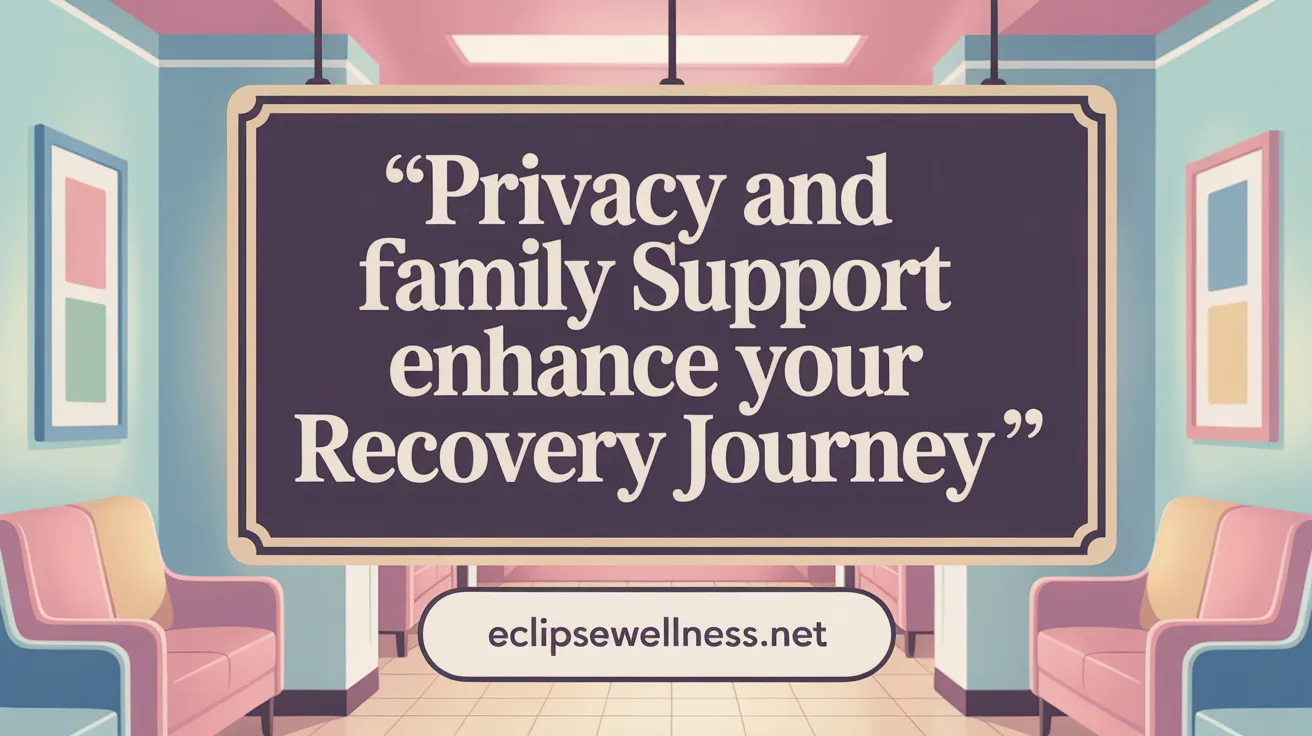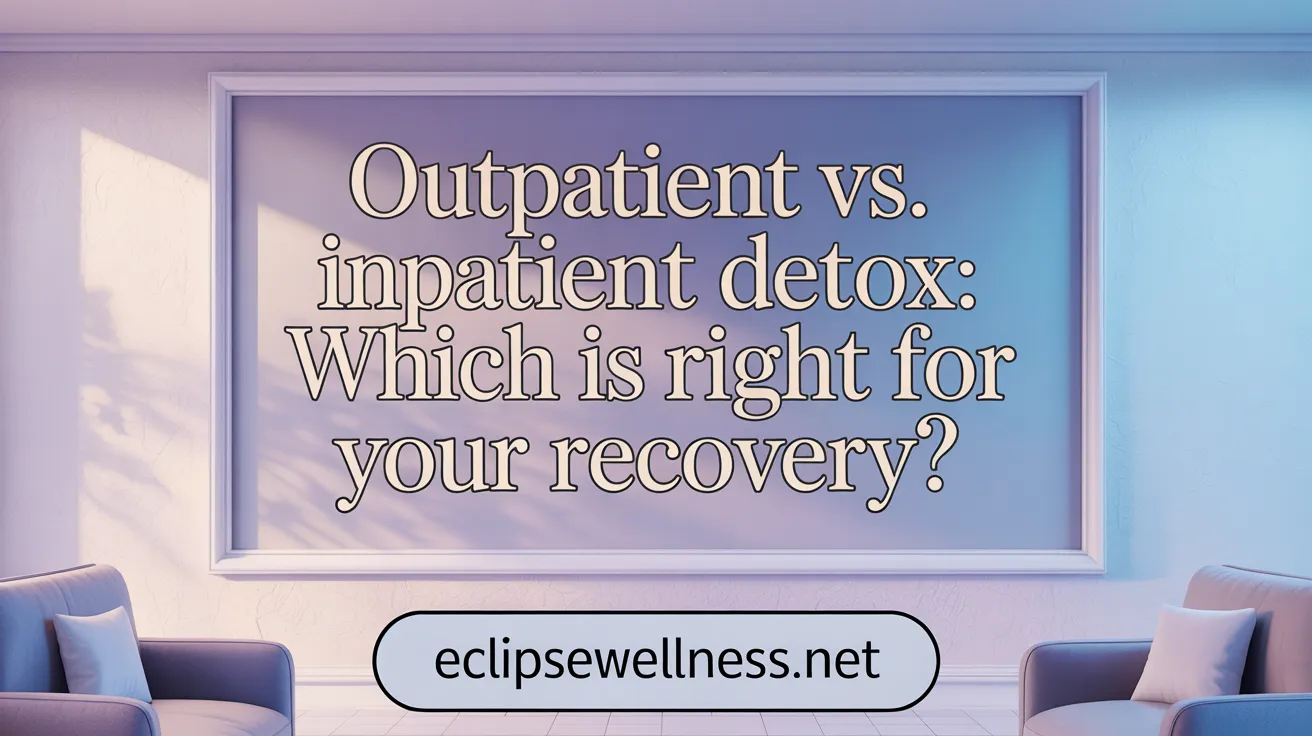Understanding Outpatient Detoxification
Outpatient detoxification is an essential and flexible treatment approach designed to help individuals safely manage withdrawal symptoms from substances such as alcohol, opioids, and benzodiazepines without requiring overnight stays. This method balances medical supervision with the freedom to maintain daily responsibilities, making it a preferred choice for many facing mild to moderate withdrawal symptoms. This article explores the advantages, processes, and what individuals can expect during outpatient detox, providing a full picture to guide those considering this pathway to recovery.
What Is Outpatient Detox and Who Is It For?

What is outpatient detox?
Outpatient detox is a medically supported recovery process designed to help individuals manage withdrawal symptoms from substances such as alcohol, opioids, and benzodiazepines. Unlike inpatient detox, it allows patients to continue living at home while receiving treatment, offering a flexible approach that fits daily life and responsibilities.
Who is suitable for outpatient detox?
This option is best suited for individuals with a stable home environment who experience mild to moderate withdrawal symptoms. Suitable candidates often have reliable transportation, strong motivation to adhere to medical advice, and do not require round-the-clock medical supervision. For more details on criteria for outpatient detox suitability, see additional resources.
How long does outpatient detox last?
Outpatient detox programs typically last between 3 to 6 months. These programs involve scheduled therapy sessions that range from 9 to 15 hours per week. The duration and intensity are tailored to individual needs based on clinical assessment. Learn more about the duration of outpatient detox programs.
What does outpatient detox include?
Outpatient detox programs involve comprehensive medical care including physician supervision for medical stabilization. Patients may receive medications to relieve withdrawal symptoms and reduce cravings. The treatment plan also incorporates intensive group therapy, individual counseling, and family support sessions. Flexible scheduling ensures that patients can maintain work, school, or family responsibilities while pursuing recovery. For additional information on outpatient detox programs and their components.
Advantages of Outpatient Detoxification

Flexibility and continuity of daily life
Outpatient detoxification allows individuals to receive treatment during the day while continuing to live at home, preserving their daily routines such as work, school, or family caregiving. This structure supports a smoother transition into recovery without major disruptions (Benefits of Outpatient Treatment, Outpatient detox overview).
Lower cost compared to inpatient care
Outpatient programs generally cost significantly less than inpatient services since they do not include room and board expenses. This affordability makes detox accessible to a broader range of individuals (Outpatient rehab benefits, Inpatient vs outpatient rehab).
Increased privacy and personalized care
Receiving treatment while staying at home offers enhanced privacy. Outpatient detox programs often provide individualized treatment plans tailored to the patient's medical history, withdrawal severity, and personal needs (Individualized addiction treatment, Personalized treatment plans).
Family and social support integration
Outpatient detox strongly encourages family involvement through education sessions and counseling. This helps build a supportive home environment, which is crucial for long-term recovery success (Family involvement in outpatient rehab, Family support in recovery.
Suitability for mild to moderate withdrawal symptoms
This setting is best suited for patients experiencing mild to moderate withdrawal symptoms who do not require intensive medical supervision. It allows patients to avoid the higher risks and costs associated with inpatient hospitalization (Outpatient detox suitability, Comparison of inpatient and outpatient detoxification).
| Advantage | Explanation | Benefit |
|---|---|---|
| Flexibility | Treatment with daily routines intact | Maintains employment and family roles (Benefits of Outpatient Treatment) |
| Cost-Effectiveness | Less expensive than inpatient care | More affordable access to detox (Outpatient rehab benefits) |
| Privacy | Treatment at home | Greater comfort and discretion (Personalized addiction treatment |
| Family Involvement | Sessions include family education | Builds strong support networks (Family involvement |
| Appropriate for Mild Cases | Targets mild/moderate withdrawal | Safer and less disruptive for suitable patients (Outpatient detox suitability) |
The Outpatient Detox Process: What to Expect
What happens during outpatient detox?
Outpatient detox begins with a comprehensive medical assessment to understand the individual's medical history, substance use, and mental health status. Based on this assessment, medical professionals develop a personalized treatment plan tailored to safely manage withdrawal symptoms and support recovery goals. Patients typically attend daily or scheduled sessions at a treatment facility while living at home, allowing them to maintain their regular routines and responsibilities.
How is withdrawal managed safely?
Withdrawal symptoms are carefully monitored by healthcare providers throughout the detox process. Medical staff use medications as needed to ease symptoms and prevent complications such as seizures or severe discomfort. Continuous oversight ensures that withdrawal is managed safely and comfortably, reducing the risks associated with unsupervised detoxification.
What medications are commonly used?
Various medications help ease withdrawal depending on the substance involved. Benzodiazepines like chlordiazepoxide or diazepam are commonly prescribed for alcohol and benzodiazepine withdrawals. For opioid withdrawal, medications such as buprenorphine or methadone are used to reduce cravings and symptoms. Supportive drugs such as anti-nausea agents and pain relievers may also be administered to improve comfort.
What therapeutic interventions are included?
Outpatient detox incorporates both group therapy and individual counseling to address the psychological aspects of addiction. Group sessions provide peer support and education on coping strategies, while individual therapy focuses on personal challenges, trauma, and relapse prevention planning. Family involvement through counseling and support sessions is often encouraged to strengthen recovery support.
How are monitoring and follow-up conducted?
Patients receive ongoing monitoring during treatment sessions, with regular medication adjustments and symptom assessments by medical staff. Follow-up care includes scheduled appointments to evaluate progress and make necessary modifications to the treatment plan. This structured approach helps maintain stability and transitions patients smoothly into longer-term rehabilitation programs.
How is a relapse prevention plan built?
Developing a relapse prevention plan is a crucial part of outpatient detox. Therapists work with patients to identify personal triggers, develop coping mechanisms, and establish a support network. This plan often includes referrals to continuing care options such as outpatient therapy, support groups like Alcoholics Anonymous, and family involvement to promote sustained recovery.
Comparing Outpatient and Inpatient Detoxification

How does outpatient detox compare to inpatient detox?
Outpatient detox programs allow individuals to live at home while attending scheduled treatment sessions, enabling them to maintain daily activities such as work, school, and family responsibilities. This setting is typically recommended for those experiencing mild to moderate withdrawal symptoms and who have a safe and supportive home environment. It tends to be more affordable and less disruptive to daily routines. Learn more about Outpatient Drug & Alcohol Detox Centers and the Benefits of Outpatient Treatment.
In contrast, inpatient detox involves residing at a medical or treatment facility with 24/7 medical supervision. This setting is suited for individuals with severe withdrawal symptoms or those at risk of complications such as seizures or delirium tremens. Inpatient detox provides a controlled environment free from access to substances and immediate medical attention if needed; however, it is more costly and requires patients to take time away from their usual responsibilities. For more details, see Inpatient vs Outpatient Detoxification and Inpatient and Outpatient Rehab Comparison.
Suitability for withdrawal severity
Inpatient detox is generally advised for those with severe or complicated withdrawal symptoms, including alcohol, benzodiazepine, or opioid dependencies that could lead to life-threatening conditions. Conversely, outpatient detox is suitable for patients with mild to moderate withdrawal symptoms and no significant medical or psychiatric comorbidities. Refer to the Alcohol Detoxification Overview and Outpatient Detox Overview for more information.
Cost and time commitments
Outpatient detox programs involve shorter, typically daily visits lasting about 3 to 14 days, averaging around 6.5 days. They are lower cost, allowing patients to maintain employment and social activities. See Outpatient Rehab Benefits and Outpatient Detox Duration.
Inpatient detox often lasts 5 to 14 days with continuous medical staff, higher costs due to room, board, and intensive care, and greater time commitment away from home. Read more on Inpatient vs Outpatient Rehab and Inpatient Treatment Overview.
Relapse risk and completion rates
Outpatient detox programs may face higher relapse risks, especially for opioid use disorders, because patients can access substances and environmental triggers more easily. However, the involvement of family and continued social support in outpatient settings can offset some risks. For insights, see Relapse Rates in Outpatient Detox and Outpatient Detox and Family Involvement.
Studies indicate that completion rates may be higher for outpatient detox in some cases, but this depends on patient motivation and severity. See Outpatient Detoxification for Alcohol Dependence for detailed findings.
Long-term outcome comparisons
Research reveals no substantial difference in long-term treatment outcomes between inpatient and outpatient detoxification. Success often depends more on individual factors such as psychiatric severity, support systems, and readiness for treatment rather than the detox setting itself. Detox serves as an important first step in recovery, and transitioning from detox to ongoing treatment with psychological, family, and social interventions is crucial for sustained sobriety. Consult sources like Inpatient vs Outpatient Treatment for Substance Use Disorder for more information.
| Aspect | Outpatient Detox | Inpatient Detox | Notes |
|---|---|---|---|
| Supervision | Regular scheduled visits; less continuous monitoring | 24/7 medical supervision | Inpatient better for severe symptoms. See Medical Detox Benefits |
| Suitable withdrawal severity | Mild to moderate withdrawal symptoms | Severe withdrawal; high-risk patients | Severity guides setting choice. More at Alcohol Detoxification Overview |
| Cost | Lower cost; less disruption | Higher cost; longer time away from home | Outpatient more affordable. Refer to Outpatient Rehab Cost Comparison |
| Time commitment | Shorter daily sessions; average ~6.5 days | Continuous stay; 5 to 14 days | Outpatient allows daily life maintenance. See Outpatient Detox Duration |
| Relapse risk | Higher risk due to triggers and access to substance | Lower risk due to controlled environment | Family support critical in outpatient setting. See Relapse Prevention Strategies |
| Long-term outcome | Comparable to inpatient; depends on patient characteristics | Comparable; depends more on individual factors | Setting less influential than patient readiness and comorbidities. Details at Inpatient vs Outpatient Treatment |
Safety and Medical Considerations in Outpatient Detox
Is outpatient detox safe?
Outpatient detox is considered safe when supervised by qualified medical professionals and specifically tailored to those without severe withdrawal risks or complicating medical issues. This setting allows individuals to undergo medically supervised withdrawal while maintaining their daily routines, provided their symptoms are mild to moderate and they have a supportive home environment.
Who is not a good candidate for outpatient detox?
Outpatient detox is generally not suitable for individuals experiencing severe withdrawal symptoms, such as a history of seizures or delirium tremens. Patients with significant coexisting medical or psychiatric conditions or those lacking a safe and stable home setting usually require the more controlled and closely monitored environment of inpatient detoxification.
What assessment tools guide detox setting decisions?
Clinicians use standardized screening instruments like the CAGE questionnaire and the Alcohol Use Disorders Identification Test (AUDIT) to evaluate the severity of substance use and assess withdrawal stages. These tools assist in determining the appropriate level of care, ensuring that patients at risk of severe withdrawal receive inpatient care, while those with less severe symptoms may be safely managed as outpatients.
How do medications help in safety?
Medications play a crucial role in enhancing the safety of detoxification. Benzodiazepines are commonly employed during alcohol detox to reduce withdrawal symptoms and prevent seizures. For opioid dependence, medications such as methadone and buprenorphine alleviate withdrawal symptoms and cravings, supporting a safer and more manageable detox process. This medical management reduces the risk of complications and improves overall treatment outcomes.
Transitioning from Detox to Ongoing Treatment
What happens after outpatient detox?
After completing outpatient detox, individuals are encouraged to engage in further treatment options to maintain sobriety and tackle the psychological aspects of addiction. This may involve enrolling in outpatient rehab programs, entering residential care, or joining support groups like Alcoholics Anonymous or Narcotics Anonymous. These ongoing treatments provide structured environments where patients can develop coping mechanisms necessary for long-term recovery.
How does outpatient detox facilitate long-term recovery?
Outpatient detox acts as an initial but crucial step in recovery by incorporating early intervention strategies. It offers psychological support alongside medical stabilization, engages family members through support sessions, and focuses on relapse prevention planning. This comprehensive approach helps patients build relapse resilience and equips them with tools to manage cravings and triggers, effectively smoothing the transition into extended treatment programs.
Why is family support critical post-detox?
Family involvement plays a vital role in sustaining recovery. Emotional encouragement, stability, and a nurturing home environment from family members significantly improve adherence to treatment plans. Their support reduces feelings of isolation and stress that commonly trigger relapse. Weekly family sessions in outpatient settings educate relatives about addiction and recovery, fostering understanding and collaboration that bolster the patient’s long-term success.
Types of ongoing treatments post-detox
- Outpatient Rehabilitation: Includes individual counseling, group therapy, and medication management while living at home. See Outpatient Drug and Alcohol Rehab.
- Residential Treatment: Offers 24-hour supervision and intensive therapy. Learn more about Inpatient vs Outpatient Rehab.
- Support Groups: Peer-led programs providing social support and accountability.
Role of outpatient programs as step-down care
Outpatient programs serve as a less intensive but continuous treatment option following inpatient detox or rehab. They allow patients to apply newly learned skills in real-world settings while maintaining access to professional and peer support. For detailed info, see Outpatient Detoxification of Addicted Patients.
Relapse prevention strategies
Effective relapse prevention combines therapy, coping skill development, family involvement, and ongoing medical or psychological support. Early identification of triggers and proactive interventions during outpatient care reduce the risk of returning to substance use. For strategies and tools, visit Benefits of Outpatient Treatment.
This integrated approach from detox through ongoing treatments, supported by family and professional care, optimizes recovery outcomes and helps individuals reclaim healthy, substance-free lives. For more behavioral health resources, including data and public health initiatives, see SAMHSA Mental Health and Substance Use Resources.
Accessing Outpatient Detox Services and Resources
How can individuals find outpatient detox services?
Finding outpatient detox centers is facilitated by resources like FindTreatment.gov, a U.S. government website that offers searchable directories of accredited treatment facilities. The platform provides detailed information on outpatient detox programs nationwide, including types of treatments offered and what to expect during care.
Is outpatient detox covered by insurance?
Many outpatient detox programs accept insurance coverage, including Medicaid and Medicare, which helps reduce out-of-pocket expenses. For more details on coverage, see Mental health services covered by Medicare. However, insurance plans differ widely in what they cover. It is important for individuals to verify their specific benefits and coverage details directly with treatment providers and insurance companies before enrolling.
What should one consider when choosing a program?
Selecting an outpatient detox program involves several important considerations:
- Alignment with personal treatment needs and goals
- Credentials and certification of medical and counseling staff
- Affordability and availability of insurance acceptance
- Ease of location access and transportation options
- Availability of treatment modalities such as medication-assisted therapy and behavioral counseling
- Support for co-occurring mental health disorders
Evaluating these factors helps ensure the chosen program is a good fit and thus enhances the chances of successful recovery. Comprehensive guides on outpatient treatment can be found at American Addiction Centers Rehab Guide and Hazelden Betty Ford outpatient treatment.
Are there confidential helplines and support services?
Yes, numerous confidential, 24/7 helplines support individuals seeking help with substance use and mental health issues. Notable examples include the 988 Suicide & Crisis Lifeline and the National Helpline for substance use treatment referrals. These services provide crisis support and assistance navigating treatment options while maintaining privacy and confidentiality.
Patient rights and confidentiality in outpatient care
Outpatient detox programs uphold patient rights such as privacy, informed consent, and access to personalized care plans. Confidentiality is central, with information protected by law unless consent is given or safety concerns arise. Patients have the right to understand treatment procedures, ask questions, and participate fully in decisions regarding their care. For more about standards of outpatient care and patient protections, see Inpatient and outpatient treatment for substance use disorder.
This comprehensive approach to accessing outpatient detox services ensures individuals find safe, effective, and supportive paths to recovery while maintaining their dignity and personal responsibilities.
Making the Choice: Embracing Outpatient Detox for Recovery
Outpatient detoxification offers a vital and adaptable pathway to begin recovery from substance dependency, especially for those with mild to moderate withdrawal symptoms and a stable support system. Its benefits of flexibility, affordability, and integration with daily life make it an accessible option for many individuals seeking to reclaim sobriety without compromising responsibilities. While safety considerations dictate the need for inpatient care in more severe cases, outpatient detox remains a proven, medically supervised approach that emphasizes personalized care and family involvement. As the first critical step, outpatient detox prepares patients for sustained treatment and lifelong recovery, supported by medical professionals, evolving therapies, and community resources. Empowered with knowledge and professional guidance, individuals can confidently embark on the journey toward health and healing through outpatient detox.
